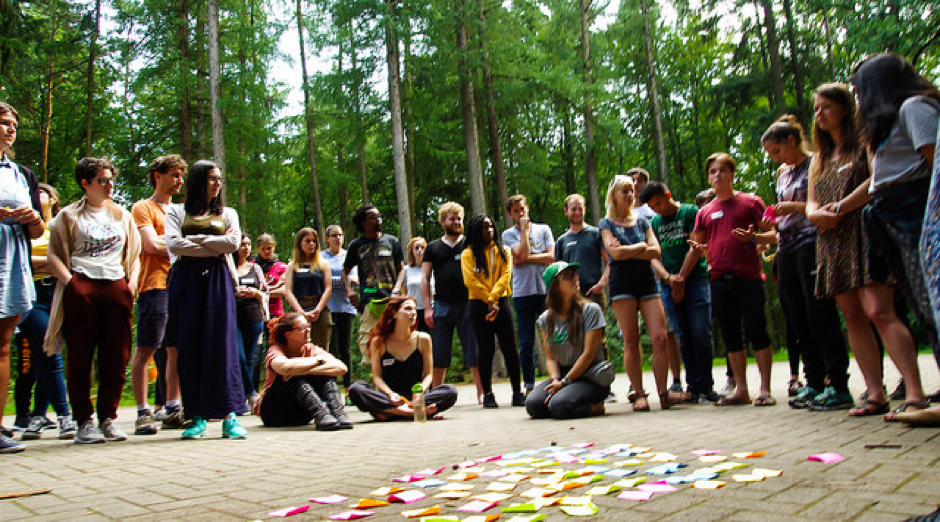Louise McKeever
About me: I am a young climate activist. I organise with Young Friends of the Earth Scotland and Fossil Free Glasgow, a local campaign group working to get our council to divest their pension fund from fossil fuel companies. I cannot speak on behalf of “young people” and all the intersections that come with this, but put forward some ideas and challenges that we can bring to the climate debate.
Intergenerational injustice
Young people and future generations are burdened by the inaction of older generations. They have failed to act realistically in the face of climate crisis. By upholding the status quo of economic growth, excessive consumption and capitalism, generations to come will have to survive on an unstable planet.
Education for a capitalist society
Rather than educate us to understand and live in relation with the world, we are professionalised. Knowledge and skills that were passed on from generation to generation of how to grow, cook, and create have been lost.
Instead we’re taught how to make money and sell things, set to work for destructive industries such as marketing and finance. Businesses that are inherently tied to the destruction of the planet and our futures.
Our first act of resistance can be to reclaim the skills and knowledge of survival and community, ensuring to teach them to each other freely.
Rising to the challenge, Young Friends of the Earth Scotland runs regular “skill-shares”. Young people teach each other the skills needed for the world we are entering into. I’ve had the joy of learning about power and privilege, permaculture and how to forage wild plants in one weekend. Active facilitation and popular education techniques make these teachings accessible and engaging.
A vibrant network of young people has been created who are demanding the changes we need to see in all levels of society.
Young people at the forefront of the climate movement
While our leaders and politicians distract and stall on making realistic policies to mitigate carbon emissions, young people are setting example of climate action.
After 2009 when Peru’s president had just opened the jungle to oil development, ensuring the displacement of thousands of indigenous people, Majandra Rodriguez Acha, a climate justice activist from Lima, Peru created TierrActiva Perú. It is a network supporting young urban activists to connect and organise with indigenous activists at the front lines of the battle for the climate (1).
Ekai Nabenyo is a young activist from Turkana, Kenya, a community he has described as being detrimentally effected by exploitation from oil companies (2). Ekai founded the Lorengelup Community Development initiative which focuses on youth empowerment, community development and environmental conservation. Alongside young people in his community he led a tree planting campaign, adding 77,000 new indigenous and exotic trees to the villages and lobbied at COP 21 in Paris.
In the US, on October 29th, 21 young people are suing the federal government for violating their constitutional right to a safe climate in a landmark case of “Julianna vs the US” (3).
In the UK and Ireland the divestment campaign that is led by young activists has had huge successes. The campaigners demand that universities and local council’s stop investing in fossil fuel companies. As a result of student activism over £80 million pounds has been divested from UK and Ireland Universities from fossil fuel companies (4).
Politicians, False Friends of the Climate Movement
Politicians need to make informed climate policies that give young people the confidence that they are investing in our future. Instead we are at the mercy of dishonest politicians claiming to be “climate warriors” while overtly supporting the oil and gas industry. Justin Trudeau was quoted for saying “there is no hiding from climate change” (5) while the month before he made plans to nationalize the Kinder Morgan pipeline running from the tar sands of Alberta.
In Scotland, the First Minister Nicola Sturgeon spoke at a Youth Climate Summit on how she was a “climate warrior” despite investing £43 million in the oil and gas industry (6).
The decisions made today by “progressive” leaders are ultimately ruining the chances of a safe planet for future generations.
Reclaiming our power
We are powerful. Young people have always been at the forefront of the fights for civil liberties. With our creativity, energy and anger we can change things.
Evidence shows we cannot depend on global leaders to act realistically or morally. By building networks of young people to support and shelter each other, we can transition out of the capitalist fuelled climate nightmare. We need ourselves and our friends to be bold and set examples of alternative lifestyles.
It is time for older generations to step up and use their privilege to support us financially and stand beside us demanding change.
To sit back in the comfort of privilege at the expense of younger generations is frankly a crime against humanity.
This is not just a fight for the young. We need everyone to be bold, creative and their actions to be life changing.
Read more!
(1) Imbler, S. (2016, October 24). In Peru, this young activist is sparking a movement for climate justice. Grist.
(2) Nabenyo, E. (2015, November 9). Climate change in Kenya; if we don’t act now, we Turkana could lose our homes. The Guardian.
(3) Savage, K. (2018, April 12). Youth Climate Case Vs U.S Government will head to trial in October. Climate Liability News.
(4) Ottery, C. (2018, April 13). Mapped: The UK universities that have pledged to divest from fossil fuels. Desmog.
(5) McKibben, B. (2018, May 30). Say hello to Justin Trudeau, the world’s newest oil executive. The Guardian.
(6) Bright Green Editors. (2018, April 29). Sturgeon speech interrupted by protest against support for oil industry. Bright Green.

